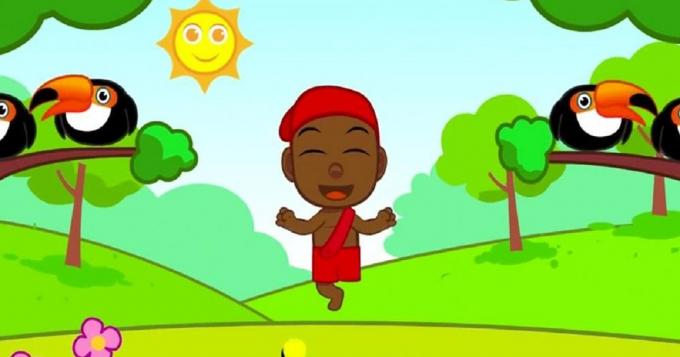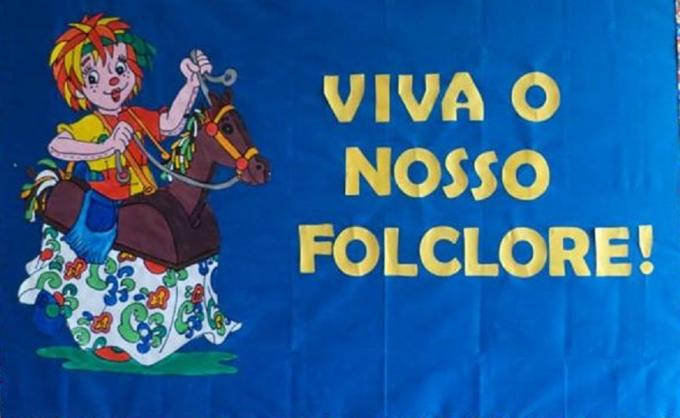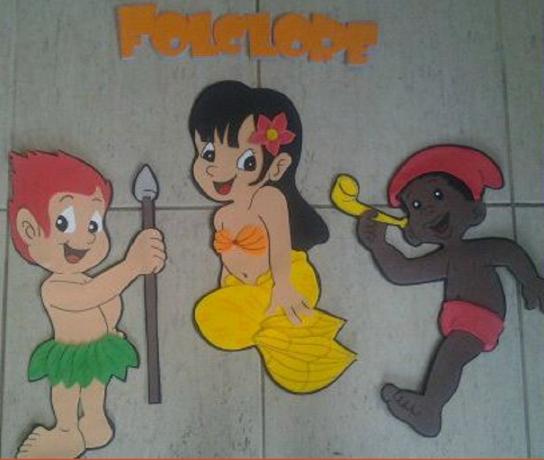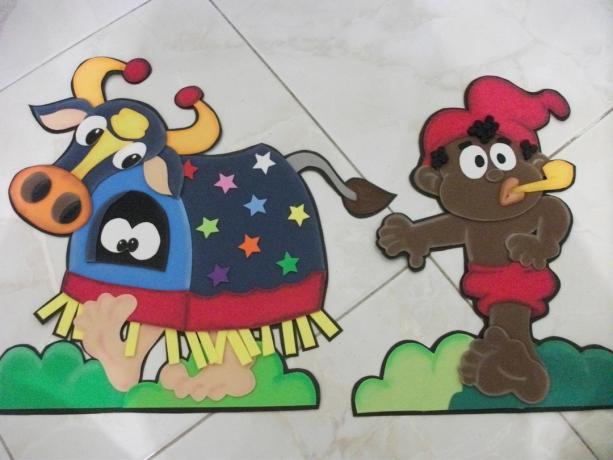We selected in this post several ideas and templates ready for your Folklore Lesson Plan for Elementary and Early Childhood Education.
Folklore is celebrated on the 22nd of August. It is a cultural tradition of a people, where customs, legends, beliefs and popular festivals are transmitted from generation to generation.
The word folklore is composed of two other words, meaning the knowledge of a people. Its origin is English – folk (people) and lore (knowledge).
Brazilian folklore is very rich and has different manifestations: legends, songs, parlendas, riddles, toys and games, proverbs and popular sayings, crafts, truck bumper phrases, tongue twisters, food and home remedies, beliefs and superstitions, literature, poetry and others, that need to be acquaintances.
See too: Folklore panel.
Index
Start the study of legends from the concepts that the children themselves know about the subject:

Check out others ideas for work the folklore at school.

Folklore Lesson Plan for the 3rd year of Elementary School

Folklore Lesson Plan for Early Grades

Folklore Lesson Plan - The Brazilian Folklore
The need to keep the culture of the people alive in order to provide and disseminate the knowledge and information so necessary in the construction of our history led me to develop this project, which helps to understand "Today", based on previous experiences, rescuing "yesterday", without it being erased with time and new generations do not have access to their origin.
Main goal: Have knowledge of Brazilian folklore, identifying its characteristics and values.
what do you know
what they don't know
would like to know

Folklore is the way of acting, thinking and feeling of a people or group with the qualities or attributes that are inherent to it, whatever the place where time and culture are located. It's not just the past, the tradition; he is alive and is connected to our lives in a very strong way. That's why it's so important to get to know him.
Folklore knowledge is what we informally learn in the world, through social interaction – orally or by imitation. It is universal, although local or regional adaptations take place as a consequence of collective additions.
a) Personal and Social Formation: socialization, respect, valuing the other, autonomy, initiative.
b) Oral and Written Language: speech, dialogue, argumentation, parlenda, tongue twister, riddles, songs, writing, recipe, reading, legends, informative texts.
c) Nature and Society: history of toys and games, different ways of singing, playing and telling stories.
d) Movement: dancing, playing.
e) Music: songs.
f) Art: dramatization of legends.
g) Mathematics: construction of toys (shapes, colors, measurements, recipes).
The observation of the children's forms of expression, their involvement in activities and satisfaction in their own productions will be an instrument for monitoring the work that will help in the evaluation and re-planning of the action educational.

children's folklore lesson plan

Folklore Lesson Plan Early Childhood Education at School
Folklore is the strongest expression of the way of life of each social group. So taking into account the importance of cultural manifestations in the life of the population and the need for their preservation, we intend through this Folklore Project early childhood education to promote the integral development of the student, through playful and educational activities, helping them to establish a relationship with the past and the gift.
Relating knowledge, games, legends, characters, songs, toys, poetry, beliefs, proverbs, with the current daily life.
Using the technological resources available at the school, we will help to make this connection, as the continuous change of new technologies influence the way of life, work and social development of students, causing the need to transform teaching processes learning.
Therefore, helping students to recognize this link between the old and the new is fundamental for the construction of the collaborative knowledge, where family, friends, school and community are involved, in which everyone can learn and teach.
Target audience of this children's education folklore project: Kindergarten and Early Grade students, as long as the activities are adapted according to each level of learning.
SPECIFIC OBJECTIVES:
Folklore can be defined as the science that studies all manifestations of popular knowledge, considered indispensable for the social and psychological knowledge of a people. Therefore, activities that aim to rescue popular culture through legends, songs, games, riddles, parlendas, etc. will be proposed. The activities will be developed individually and collectively, and for this it will be proposed:
Subscribe to our email list and receive interesting information and updates in your email inbox
Thanks for signing up.